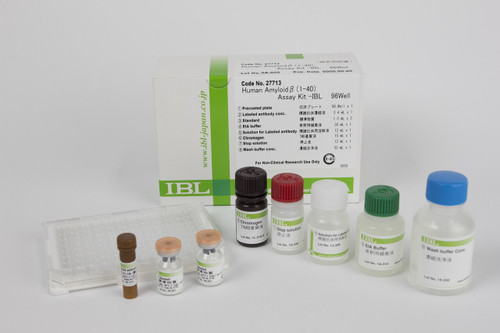Solid phase sandwich ELISA for the determination of BACE1 in human, mouse or rat brain extracts or cultured cell lysate. For research use only, not for use in diagnostic procedures.<br><br>
Neuropathologically Alzheimer’s disease (AD) is characterized by widespread deposition of amyloid β protein (Aβ) in the cerebral cortex, and since the intracerebral accumulation of Aβ is highly specific for AD and the gene mutation responsible for familial amyloidosis causes Aβ to increase, Aβ is thought to be of extremely great significance in the pathogenetic mechanism of AD. Aβ is generated by proteolysis of the Aβ precursor protein (APP), a type I membrane protein. The enzyme that cleaves it at the N-terminal is called β secretase, and it is regarded as being the protease that acts at the initial step in the production of Aβ. The major β secretase has been identified as β-site APP Cleaving Enzyme 1 (BACE1), and BACE2 has been isolated as its homologue.
- Assay Description:
- 1 hour incubation (37°C) + 30 min. (4°C) + 30 min. (RT) = 2 hours total incubation time
- Catalog number:
- 27752
- configuration:
- 96 Determinations, 12x8 removable strips
- controls:
- None provided
- design:
- Solid phase sandwich ELISA using 2 kinds of high specific antibodies
- FDA Status:
- For research use only, not for use in diagnostic procedures
- MSDS:
- notes:
- The protocol for this product (see above) is intended to serve as an example only. Please refer to the Instructions For Use provided with the assay kit for precise details.
- Protocol:
- Sample volume:
- 100 μL of properly diluted unknown / determination
- Sample types:
- Human/mouse/rat brain extracts or cultured cell lysate
- standards:
- 8 standards, serially diluted from 1 prepared lyophilized standard
- Standard range:
- 0 / 1.56 - 100 ng/mL
- storage:
- 2 - 8 °C
- Species:
- Human, Mouse, Rat
- sensitivity:
- 0.16 ng/mL
- Products related:
- The control set is available for sale on request
- Additional info:
- References:







